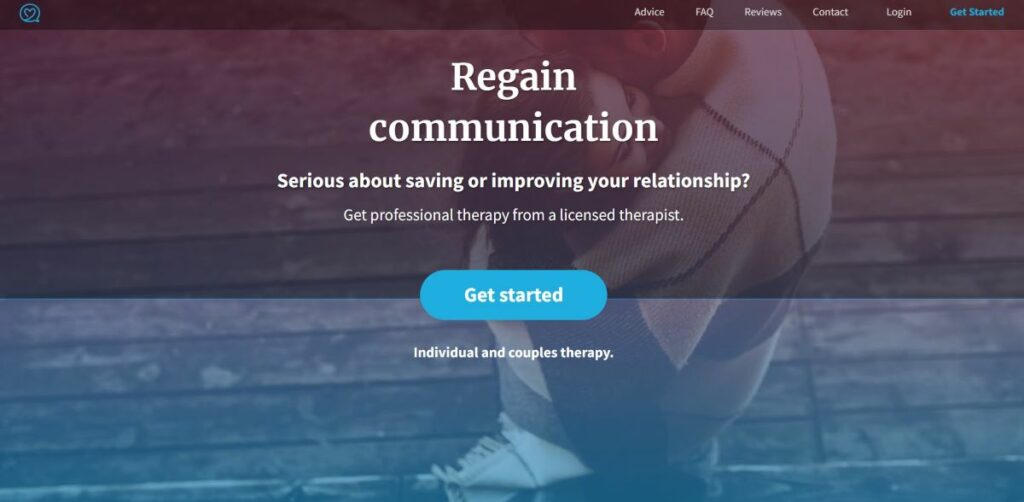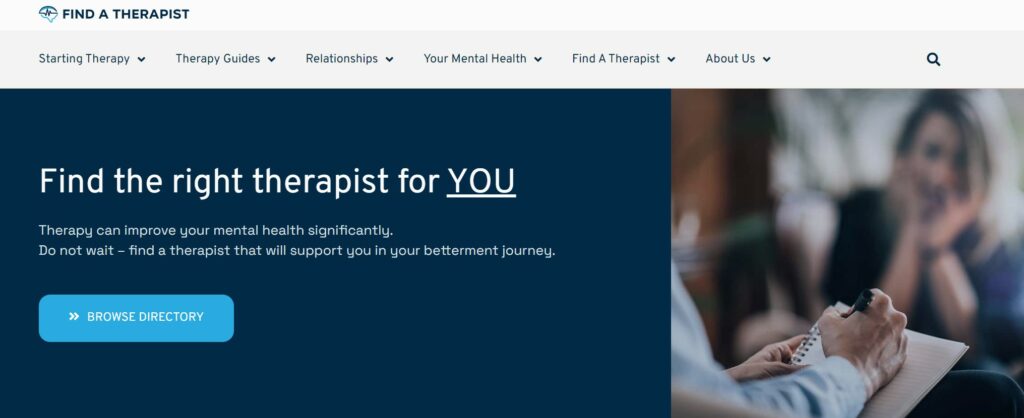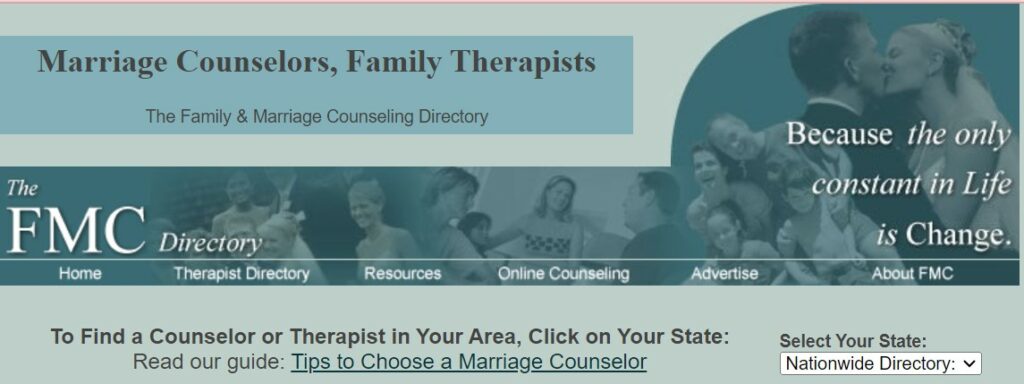We are fortunate to live in a day and age where family counseling does not have the same stigma as it once did.
It’s now possible to see a family counselor for a wide variety of different issues, from conflict resolution to parenting difficulties, and from spiritual challenges to step-family issues. We even have the option to see a counselor virtually using a computer, phone, or tablet, as well as in-person in a traditional office setting.
In this guide, we’ve explained how to find the right counselor for you and your family.
Want to skip right to the suggestions for family counseling? Here are our 6 recommended therapy solutions:
Family Counseling Near Me and Online
Below, we’ve looked at six places that can connect you with a licensed, qualified family counselor. We will look at how to use each resource, its features, and the costs involved.
| Provider | Good For | Location | Pricing |
|---|---|---|---|
| ReGain | Quick match with the right couples therapist for you | Online therapy | $65 to $90 per week (billed every 4 weeks) |
| Ritual | Couples guidance through proven interventions | Online service | $100 to $260 per month |
| Find-a-therapist.com | Finding and contacting the right couples counselor for you and your partner | Online and in-person therapy | Varies depending on the counselor fee |
| Online-therapy.com | Finding licensed and experienced therapists with a Cognitive Behavioral Therapy (CBT) approach | Online therapy | $40/week to $88/week (including our 20% discount first month) |
| TalkSpace | Relationship counseling, marriage counseling, premarital counseling | Online therapy | Varies according to insurance coverage or self-pay options |
| Family Marriage Counseling | Locating the right couples counselor for you and your partner | Online and in-person therapy in the U.S. and Canada | Varies depending on the counselor fee |
1. ReGain

Tailored for individuals and couples navigating relationship or marital issues – ReGain is your online relationship therapy solution. Starting at $65/week, you can schedule one weekly live session and message your therapist anytime. Start your path to healthier connections with ReGain – fill out their online assessment form.
- Good for: Quick match with the right couples therapist for you.
- Location: Online therapy.
- Pricing: $65 to $90 per week (billed every 4 weeks).
- Features: iOS and Android app available, message your therapist anytime, live sessions are scheduled weekly and done via live chat, phone, or video call.
ReGain is an online counseling platform that focuses specifically on relationship counseling. To use this platform for family therapy, choose couples counseling when signing up, answer some questions, and then you’ll be matched with a licensed family counselor based on your preferences and needs.
2. Ritual

Ritual assists you in healing and transforming relationship issues into opportunities with the aid of their experienced Relationship Experts and science-backed methods. Complete the Ritual assessment to begin rekindling your relationship with 1:1 sessions with experienced professionals, personalized in-app content, guided reflections, and activities between sessions.
- Good for: Couples guidance through proven interventions.
- Location: Online service.
- Pricing: $100 to $260 per month
- Features: 1-1 sessions with relationship experts, online activities and personalized skill-building content, option to join together as a couple or on your own.
Prioritize your family’s well-being by staying united and seeking guidance to fortify your relationship by using Ritual. This website offers personalized relationship guidance according to your and your partner’s needs.
3. Find-a-therapist.com

- Good for: Finding and contacting the right couples counselor for you and your partner.
- Location: Online and in-person therapy.
- Pricing: Varies depending on the counselor fee.
- Features: Filter your search, find accessible and effective online and in-person therapy, find guides on different types of therapy.
On find-a-therapist.com you can use their online directory to find qualified and licensed therapists with experience in family counseling. such as Katlyn Maves, Jeffrey Gianelli, and Sean Sprigle. Once you checked the therapist’s profiles you can contact the one you select directly.
4. Online-therapy.com

Discover transformative online therapy with Online-therapy.com. Through cognitive behavioral therapy (CBT), Online-therapy.com offers individual and couples support starting at $45/week. Engage in sessions via video, voice, or text for maximum flexibility. Fill out their online questionnaire to get started.
- Good for: Finding licensed and experienced therapists with a Cognitive Behavioral Therapy (CBT) approach.
- Location: Online therapy.
- Pricing: $40/week to $88/week (including our 20% discount first month).
- Features: Unlimited messaging with your therapist, including a daily journal and activity plan, yoga and meditation videos, and tests to see your progress.
Online-therapy.com is an online platfotrm where you can be matched with a family counselor with experience in the issues you want to address to improve you family dynamic. Online-therapy.com offers resources like worksheets, videos, and other self-help tools to complement the therapy process.
Read our online-therapy.com review here.
5. TalkSpace

Tailored to individuals, couples, teens, and offering psychiatry services, Talkspace plans kick off at a wallet-friendly $69 per week. What’s more, many health insurances also cover their services, enhancing accessibility and affordability. Complete a questionnaire and get matched with the right therapist for you.
- Good for: Relationship counseling, marriage counseling, premarital counseling.
- Location: Online therapy.
- Pricing: Varies according to insurance coverage or self-pay options.
- Features: Accepts insurance, pick your therapist from a list of recommendations, live video sessions and unlimited messaging with your therapist.
TalkSpace is a website where you will be matched with the right family counselor according to your preferences and needs assessed by an initial questionnaire. Once you are matched you can start communicating directly with your therapist.
Read our TalkSpace review here.
6. Family Marriage Counseling

- Good for: Locating the right couples counselor for you and your partner.
- Location: Online and in-person therapy in the U.S. and Canada.
- Pricing: Varies depending on the counselor fee.
- Features: Therapists directory, can be utilized free of charge, contact therapists directly via phone or email.
Family Marriage Counseling is an online directory for family and relationship therapists. Simply enter your state and city and this platform will provide a list of family counselors available near you. Many therapists list their specific areas of expertise, and some provide their website so you can contact them directly.
Why Start Family Counseling

The main reason families attend counseling together is to improve their interpersonal relationships. The breakdown of relationships can happen for a number of different reasons, such as:
- Parenting style conflicts
- Substance abuse
- Coping with divorce
- Difficulty overcoming grief
- Major life event (birth, moving, empty nest)
- Health crisis
- Disagreements with kids as they grow older
- Abuse such as violence in the home or sexual abuse
There are other times when a family is not in a crisis so to speak, but there does seem to be a breakdown in communication. This can look like:
- One or more people isolating themselves and declining to participate in family activities
- A family member defying household rules and norms
- Arguing that ranges from daily bickering to full-on shouting matches
- Parents unsure about how to discuss sensitive issues such as sex, gender identity, social media, race, politics, religion, and issues at school with their children.
- Preparing for an expected change such as a need to shift roles and responsibilities, moving somewhere new, a career change, or a child beginning to attend college.
Knowing your reason for starting counseling with your family is important, because this will help you find the right counselor for your family.
Safety
Before we discuss the common approaches to family counseling, it is important to mention some resources you can use to ensure your personal safety.
If you or a person in your family is in an unsafe situation, such as facing a threat to their person, assault of any kind, or neglect to provide basic needs including medical care, it’s important to seek immediate attention through local law enforcement or one of the following U.S national hotlines:
- Suicide prevention lifeline: 1-800-273-8255
- National Domestic Violence Hotline: 1-800-799-7233
- Substance Abuse & Mental Health Association (SAMSHA): 1-800-662-4357
- Childhelp National Child Abuse Hotline: 1-800-422-4453
What to Expect From Family Therapy

The ultimate goal of family counseling is to help with open, safe communication, and to develop more supportive relationships within the family.
Depending on your family and counselor, the sessions may look a bit different depending on whether you decide to attend online or in-person sessions.
Here are some common approaches to family counseling:
- Supportive family therapy will focus on open and safe communication, so that the relationships within the family are more supportive.
- Cognitive-Behavioral Therapy works by altering the negative thought and behavior patterns that are impacting family relationships.
- Psychodynamic therapy focuses on family members gaining insight into each other’s emotional responses, in order to change how family members relate to one another.
- Systemic family therapy identifies the roles of each family member in order to better understand the family dynamics.
- Structural family therapy focuses on family organization and communication patterns.
How Family Therapy Works
You may have noticed that while a family’s issues may be unique, repairing family relationships often comes down to communication. A major role of a family therapist is not only as an observer and confidant, but that of a teacher as well.
They teach families how to identify their emotions, and how to respectfully express them. In addition, families learn how to provide support to one another in a respectful way.
Here are some techniques that family therapists may use.
Roleplay
In order to help family members gain perspective on communication patterns, a therapist may ask the family to change roles in a hypothetical conflict.
For example, the therapist may ask a husband and wife to change roles with one another in a dispute about a parenting conflict. This gives the participants an opportunity to demonstrate how they experience the conflict.
A therapist may also direct them to act in a way they wish the other would respond, as a way to express their needs.
This activity can feel awkward initially, but can be very effective in opening lines of communication and demonstrating how to actively practice changing communication patterns in communication.
Journaling
In order to teach clients about identifying their emotions and patterns of behavior, you may be asked to journal your experience of different emotions.
For example, you may be asked to write about to what degree you experienced these emotions (such as anger 8 out of 10, 10 being the angriest you’ve ever felt), what you did when you were angry (shouted, slammed the door, isolated yourself), what preceded the anger (arrived home and the house was a mess even though everyone was home).
Journaling is a great technique to help people better identify their emotions and have more clarity into their emotional triggers, so that they can begin to communicate their needs in a more productive manner. Doing this as a family will help you develop greater insights into your family communication patterns.
Charting Responsibilities
Simply put, a therapist may assist the family with creating a chart of household responsibilities that are shared among family members. This is so that everyone understands their responsibilities and expectations of them.
Charting Behavior
This technique is often done when there is parent-child conflict. In order to encourage desirable behaviors, a therapist may ask parents to list positive behaviors that their children do and would like to increase (such as completing specific chores, helping a sibling, or resolving a conflict without yelling).
The chart is used for parents to be more mindful of recognizing and reinforcing positive behavior with praise, helping with behavior modification.
Scheduling Family Activities
It often happens that with the responsibilities of work, school, and maintaining a household, family bonding time is neglected. This can lead to neglected relationships and a breakdown in communication. One goal of therapy may be to set a schedule for family activities where fun is the main priority.
Art Therapy
Depending on the ages and interests of the family members, play and art therapy may also be part of the treatment plan. These techniques are particularly good at allowing the therapist to observe nonverbal communication, and identify patterns in communication.
With this information, a therapist is better equipped to coach families on improving communication in an engaging way.
Conclusion
Whether you are dealing with conflict about parenting styles, finding a way to support a family member, coping with divorce, experiencing a major life event, or addressing abuse in your family, with the help of a counselor, it is normally possible to have more healthy and supportive relationships with one another.
Not only is finding a family counselor near you a lot more simple today, but it’s also easier to find a therapist with the qualifications and expertise to meet your family’s unique situation. And these days, participating in family therapy can be done virtually, at a time that works for you.
References
Fisher, C. A., Hetrick, S. E., & Rushford, N. (2010). Family therapy for anorexia nervosa. Cochrane Database of Systematic Reviews, (4). Link.
Goldenberg, I., & Goldenberg, H. (1991). Family therapy: An overview. Thomson Brooks/Cole Publishing Co. Link.





